Unit 2 Parents and Children(Vocabulary))课件
文档属性
| 名称 | Unit 2 Parents and Children(Vocabulary))课件 |
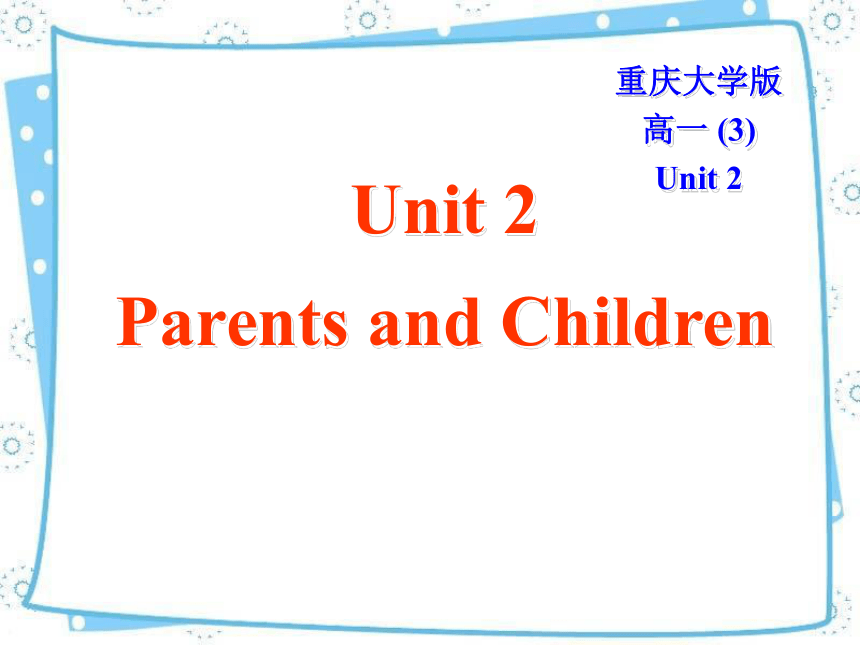
|
|
| 格式 | zip | ||
| 文件大小 | 3.9MB | ||
| 资源类型 | 教案 | ||
| 版本资源 | 重庆大学版 | ||
| 科目 | 英语 | ||
| 更新时间 | 2014-04-21 00:00:00 | ||
图片预览

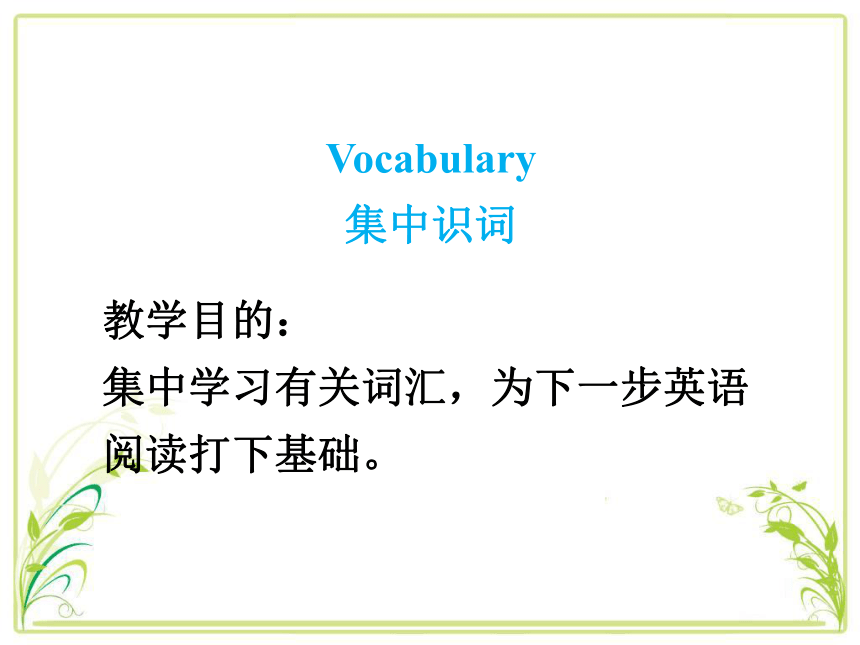
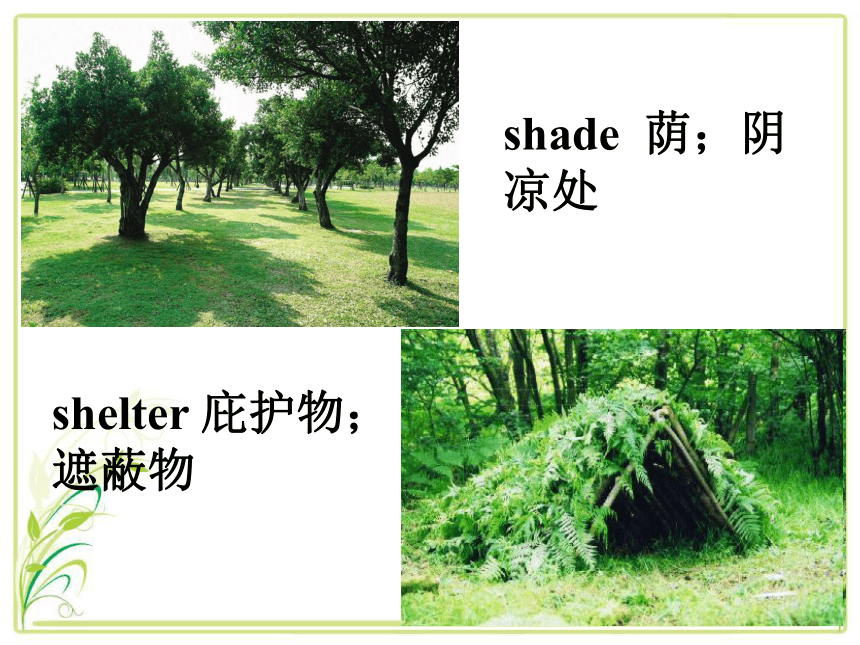
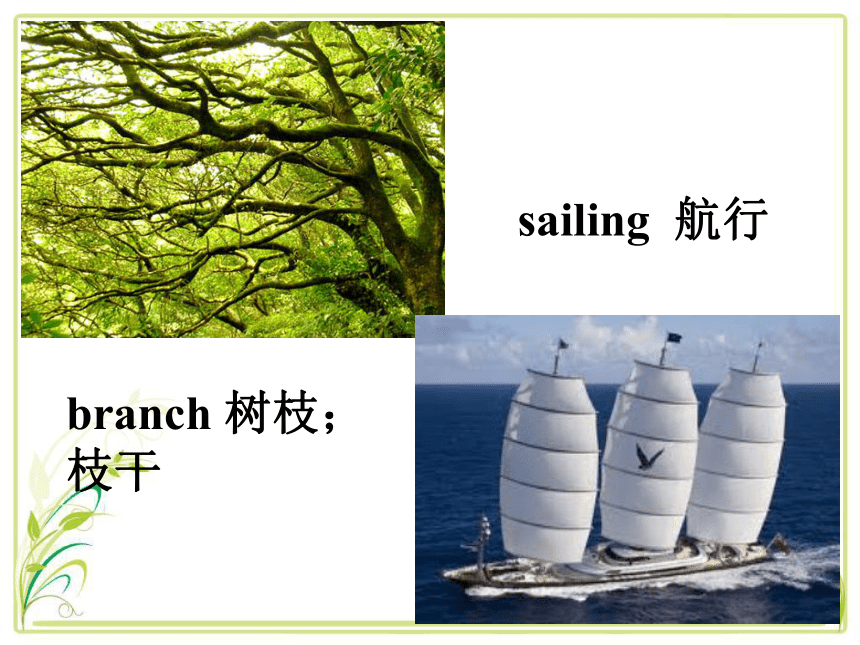
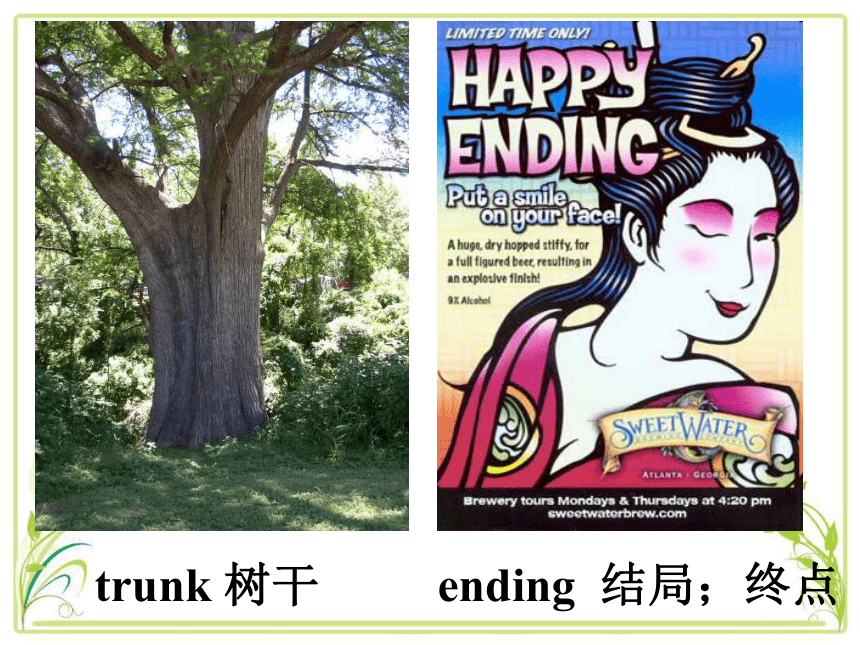
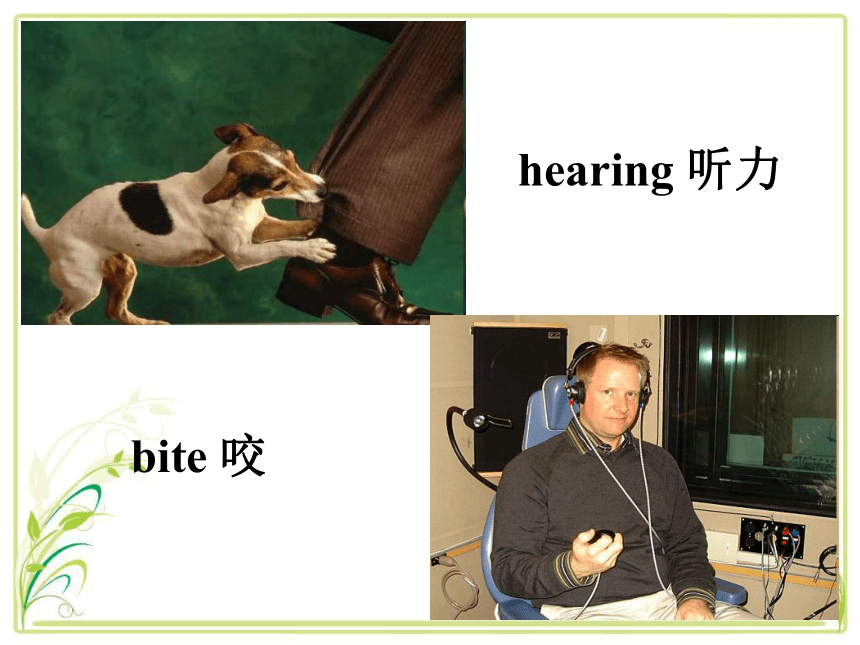
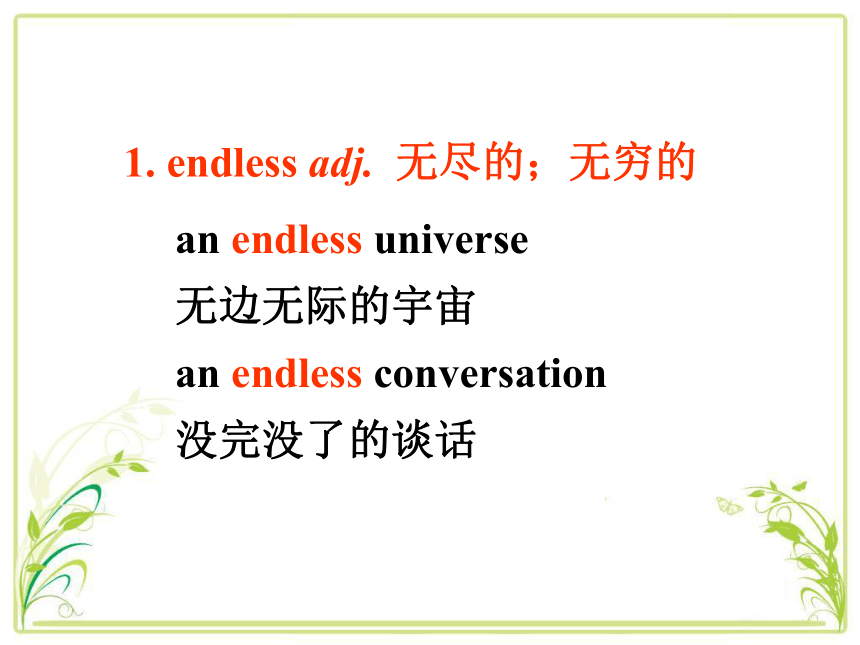
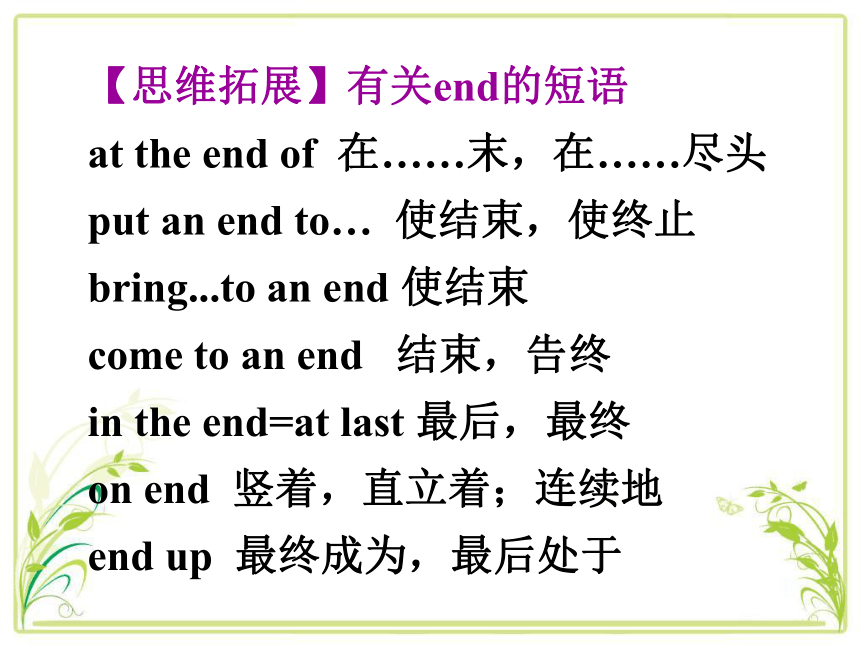
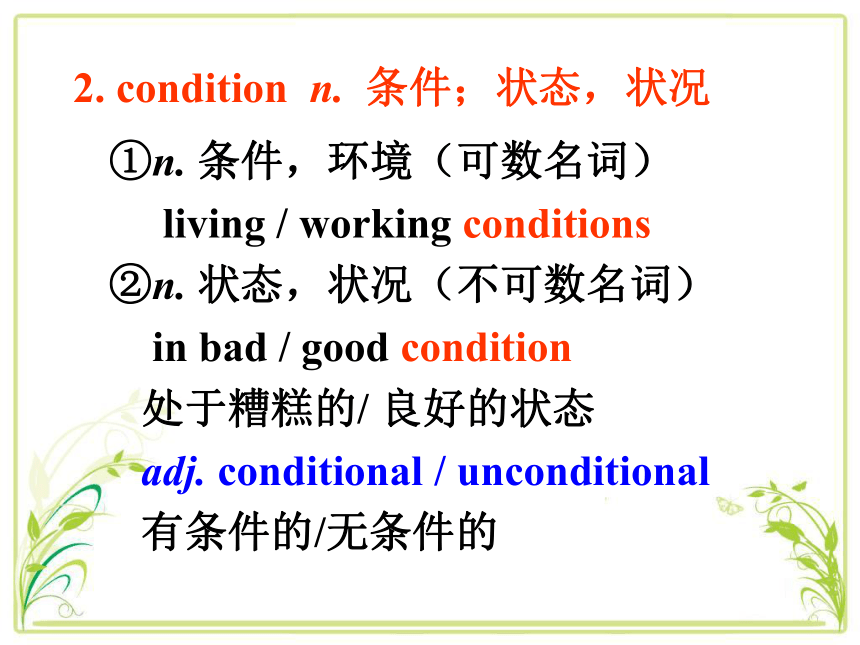
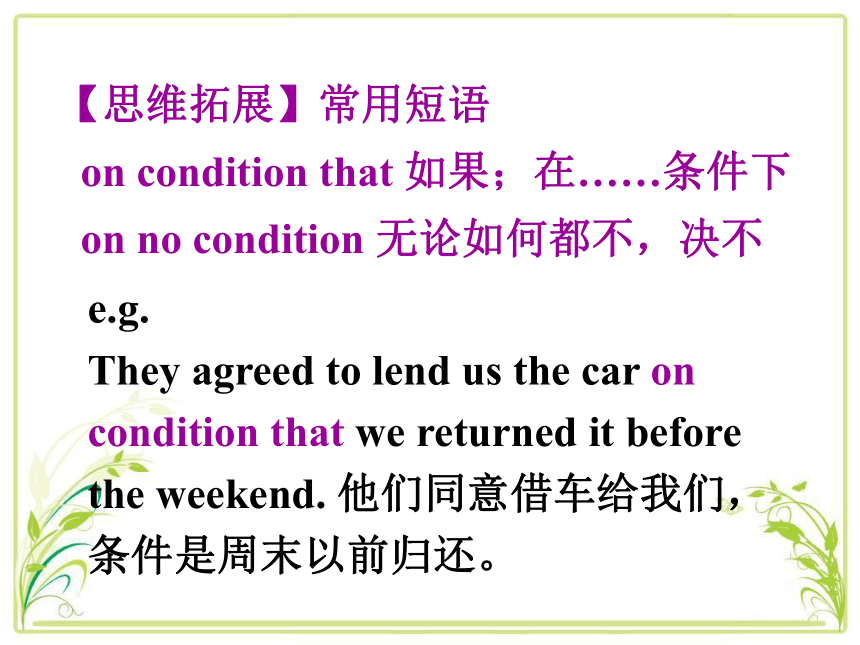
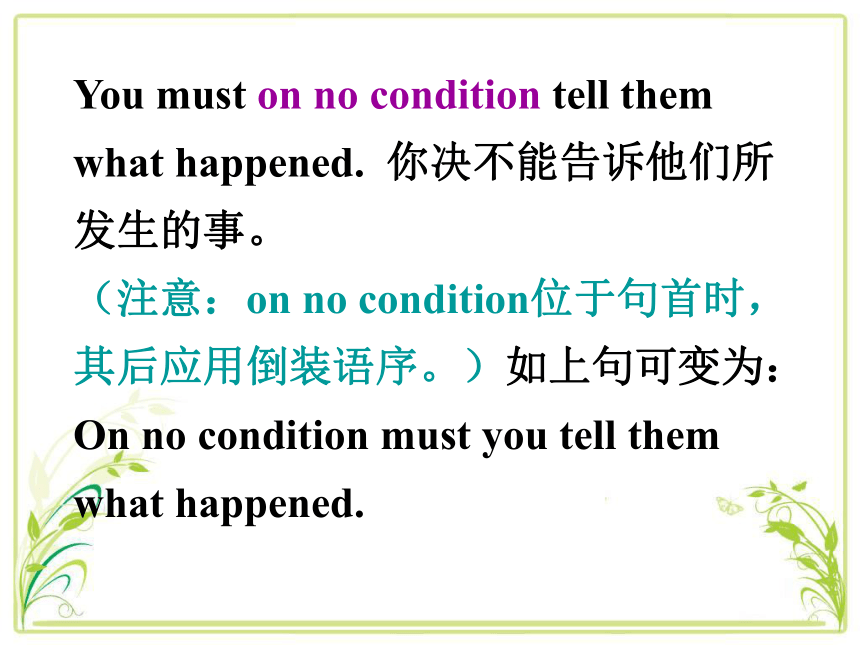
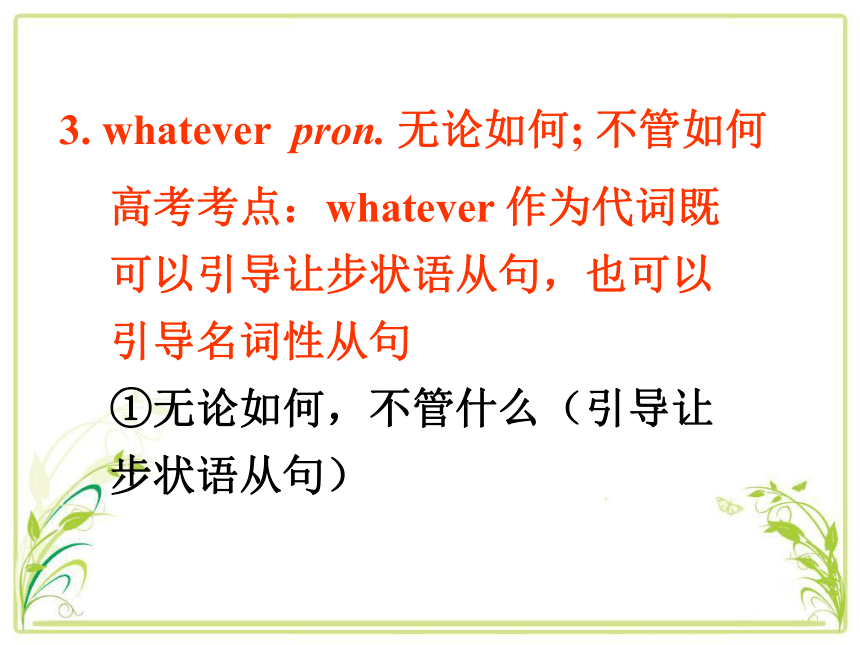
文档简介
课件50张PPT。Unit 2
Parents and Children重庆大学版
高一 (3) Unit 2Vocabulary 集中识词教学目的: 集中学习有关词汇,为下一步英语阅读打下基础。shade 荫;阴凉处shelter 庇护物;遮蔽物branch 树枝;枝干sailing 航行trunk 树干ending 结局;终点bite 咬hearing 听力an endless universe 无边无际的宇宙
an endless conversation 没完没了的谈话1. endless adj. 无尽的;无穷的【思维拓展】有关end的短语
at the end of 在……末,在……尽头
put an end to… 使结束,使终止
bring...to an end 使结束
come to an end 结束,告终
in the end=at last 最后,最终
on end 竖着,直立着;连续地
end up 最终成为,最后处于①n. 条件,环境(可数名词)
living / working conditions
②n. 状态,状况(不可数名词)
in bad / good condition
处于糟糕的/ 良好的状态
adj. conditional / unconditional
有条件的/无条件的2. condition n. 条件;状态,状况【思维拓展】常用短语
on condition that 如果;在……条件下
on no condition 无论如何都不,决不e.g. They agreed to lend us the car on condition that we returned it before the weekend. 他们同意借车给我们,条件是周末以前归还。You must on no condition tell them what happened. 你决不能告诉他们所发生的事。
(注意:on no condition位于句首时,其后应用倒装语序。)如上句可变为:
On no condition must you tell them what happened.高考考点:whatever 作为代词既可以引导让步状语从句,也可以引导名词性从句
①无论如何,不管什么(引导让步状语从句)3. whatever pron. 无论如何; 不管如何e.g.
Whatever (=No matter what) happens, we’ll meet here tonight. (让步状语从句)
不管发生什么事情,我们今晚都在这儿碰头。② 任何事物;一切事物(引导名词性从句)
e.g. Take whatever action is needed.(宾语从句)
采取任何必要的行动。
Whatever is left over is yours.(主语从句)
剩下来的所有的都是你的。典题例证1. You can contact us by telephone or e-mail, _____ you prefer.
A. whenever B. however
C. whichever D. whatever2. _________ I say, he always disagrees.
A. However B. Whichever
C. Whatever D. Whoever3. You can find ______ you need at the shopping centre.
A. whichever B. wherever
C. whoever D. whatever常用结构:be/become aware of sth./ that…
as far as sb. be aware
as far as sb. be concerned 据……所知4. aware adj. 知道的;意识到的;察觉到e.g. He was well aware of the problem.
Were you aware that something was wrong?
They suddenly became aware of people looking at them.
As far as I’m aware, nobody has done anything about it.
【思维拓展】n. awarenesse.g. He is not aware of his danger.
他没有意识到自己有危险。 辨一辨Since my daughter started to looking up to me, I have become more aware of my behavior.
由于女儿开始敬佩我,我已经更加注意自己的举止了。【体验高考】
Playing with a cell phone, he suddenly
the teacher staring at him. (2010长春高二检测)
A. knew of B. became aware of
C. reflected D. aware of常用搭配:graduate from/ in… 毕业于…
e.g. She graduated from high school last year. 她去年高中毕业。
He graduated in law. 他毕业于法学院。
a high school graduate 高中毕业生5. graduate v. 毕业 n. 毕业生【思维拓展】graduation n. 毕业
e.g. After graduation, he went abroad.常用句型:
urge sb. to do sth. / sth. / that…
e.g. We urged him to resign. = We urged his resignation. = We urged that he should resign. (注意:urge后跟宾语从句时,多用虚拟语气形式,即should+动词原形,should通常省略。)6. urge v. 敦促,催促,力劝e.g. The report urged that all children (should) be taught to swim. 这份报告呼吁给所有的儿童教授游泳。常用短语:be engaged in/on sth. 忙于
做某事
be engaged to sb. 与某人订婚
be engaged 被占用,使用中7. engaged adj. 忙于,从事于;已订婚的e.g.
He is now engaged on his second novel.
They were engaged in conversation.
She is engaged to Peter.
I couldn’t get through----the line is engaged.e.g.
The use of light and dark symbolizes good and evil. 用光明与黑暗来象征善与恶。8. symbolize v. 象征,是……的象征【思维拓展】
symbol n. 象征,符号
symbolic adj. 象征性的(be symbolic of)
e.g. The dove is the symbol of peace.
鸽子是和平的象征。
White is symbolic of purity.
白色象征着纯洁。feel like sth./ doing sth. 想要做某事;仿佛
e.g.
I feel like a cup of tea. 我想喝杯茶。
I feel like crying. 我想哭。
It feels like rain. 好像快要下雨了。9. feel like【思维拓展】
表示“想要做某事”的其它常用结构
want to do sth.
would like to do sth.show up与turn up在意义上有相同之处,有时可互换。
e.g.
He hasn’t turned up yet. = He hasn’t showed up yet.
Only a few members showed up for the meeting.10. show up 出现,现身【思维拓展】
高中英语常见的show词组:
be on show 在展览
show off 吹嘘,卖弄
show...around 带领某人到处参观pick out a familiar face in the crowd
在人群中找出熟悉的面孔
He picked out the ripest peach for me.
他给我挑了个熟透的桃子。
See if you can pick me out in this photo.
看你能不能把我从这张照片上认出来。11. pick out 选择,挑选,认出来【思维拓展】
有关pick的常用短语
pick up 捡起;收拾;开车接人;搭载;偶然得到,学会
pick oneself up(跌倒后)站起来1. I suddenly became aware ____ me.
A. that he is looking at
B. of him looked at
C. that he was looking at
D. for him looking at牛刀小试2. People at the party worried about him, because no one was aware _______ he had gone.
A. of where B. of the place where
C. where D. the place3. He promised to do that for me ____ I allowed him ____ for a few days.
A. on condition that; to leave
B. on condition if; to leave
C. on condition that; leaving
D. on the condition if; leaving4. He will have learned English for eight years by the time he _____ from the university next year.
A. will graduate B. will have graduated
C. graduates D. is to graduate5. They urged that the library ____ open during the vacation.
A. was kept B. would be kept
C. is kept D. be kept6. They ___ last week after they ___ several years.
A. married; had engaged
B. got married; had been engaged
C. married with each other; had been engaged
D. were married; had engaged7. I don’t feel like_________ now. I prefer to have a walk after supper.
A. walk B. walking C. to walk D. walks8. Not only did the Great Wall of China serve as a defense in the north but also _____ the power of the emperor.
A. symbolize B. to symbolize
C. symbolizing D. symbolized9. The fans waited and waited in the rain, but the movie star didn’t ____ at all. A. show off B. show around
C. show up D. show out10. Here are some toys. You can ____ one or two for your little son as a birthday present. A. single out B. pick out
C. work out D. find out11. The natural resources are not ___. so we should not waste them.
A. available B. endless
C. useful D. flexible12. ----“What shall we do tonight then?”
----“It’s up to you— _________ you want.”
A. however B. whenever
C. whatever D. whomever13. — Do you feel like ____ there or shall we take a bus?
— I’d like to walk. But since there isn’t much time left, I’d rather we ____ a taxi. A. walking; hired B. to walk; hire?
C. to walk; hired?? D. walking; hireGood-bye !
高一 (3) Unit 2Vocabulary 集中识词教学目的: 集中学习有关词汇,为下一步英语阅读打下基础。shade 荫;阴凉处shelter 庇护物;遮蔽物branch 树枝;枝干sailing 航行trunk 树干ending 结局;终点bite 咬hearing 听力an endless universe 无边无际的宇宙
an endless conversation 没完没了的谈话1. endless adj. 无尽的;无穷的【思维拓展】有关end的短语
at the end of 在……末,在……尽头
put an end to… 使结束,使终止
bring...to an end 使结束
come to an end 结束,告终
in the end=at last 最后,最终
on end 竖着,直立着;连续地
end up 最终成为,最后处于①n. 条件,环境(可数名词)
living / working conditions
②n. 状态,状况(不可数名词)
in bad / good condition
处于糟糕的/ 良好的状态
adj. conditional / unconditional
有条件的/无条件的2. condition n. 条件;状态,状况【思维拓展】常用短语
on condition that 如果;在……条件下
on no condition 无论如何都不,决不e.g. They agreed to lend us the car on condition that we returned it before the weekend. 他们同意借车给我们,条件是周末以前归还。You must on no condition tell them what happened. 你决不能告诉他们所发生的事。
(注意:on no condition位于句首时,其后应用倒装语序。)如上句可变为:
On no condition must you tell them what happened.高考考点:whatever 作为代词既可以引导让步状语从句,也可以引导名词性从句
①无论如何,不管什么(引导让步状语从句)3. whatever pron. 无论如何; 不管如何e.g.
Whatever (=No matter what) happens, we’ll meet here tonight. (让步状语从句)
不管发生什么事情,我们今晚都在这儿碰头。② 任何事物;一切事物(引导名词性从句)
e.g. Take whatever action is needed.(宾语从句)
采取任何必要的行动。
Whatever is left over is yours.(主语从句)
剩下来的所有的都是你的。典题例证1. You can contact us by telephone or e-mail, _____ you prefer.
A. whenever B. however
C. whichever D. whatever2. _________ I say, he always disagrees.
A. However B. Whichever
C. Whatever D. Whoever3. You can find ______ you need at the shopping centre.
A. whichever B. wherever
C. whoever D. whatever常用结构:be/become aware of sth./ that…
as far as sb. be aware
as far as sb. be concerned 据……所知4. aware adj. 知道的;意识到的;察觉到e.g. He was well aware of the problem.
Were you aware that something was wrong?
They suddenly became aware of people looking at them.
As far as I’m aware, nobody has done anything about it.
【思维拓展】n. awarenesse.g. He is not aware of his danger.
他没有意识到自己有危险。 辨一辨Since my daughter started to looking up to me, I have become more aware of my behavior.
由于女儿开始敬佩我,我已经更加注意自己的举止了。【体验高考】
Playing with a cell phone, he suddenly
the teacher staring at him. (2010长春高二检测)
A. knew of B. became aware of
C. reflected D. aware of常用搭配:graduate from/ in… 毕业于…
e.g. She graduated from high school last year. 她去年高中毕业。
He graduated in law. 他毕业于法学院。
a high school graduate 高中毕业生5. graduate v. 毕业 n. 毕业生【思维拓展】graduation n. 毕业
e.g. After graduation, he went abroad.常用句型:
urge sb. to do sth. / sth. / that…
e.g. We urged him to resign. = We urged his resignation. = We urged that he should resign. (注意:urge后跟宾语从句时,多用虚拟语气形式,即should+动词原形,should通常省略。)6. urge v. 敦促,催促,力劝e.g. The report urged that all children (should) be taught to swim. 这份报告呼吁给所有的儿童教授游泳。常用短语:be engaged in/on sth. 忙于
做某事
be engaged to sb. 与某人订婚
be engaged 被占用,使用中7. engaged adj. 忙于,从事于;已订婚的e.g.
He is now engaged on his second novel.
They were engaged in conversation.
She is engaged to Peter.
I couldn’t get through----the line is engaged.e.g.
The use of light and dark symbolizes good and evil. 用光明与黑暗来象征善与恶。8. symbolize v. 象征,是……的象征【思维拓展】
symbol n. 象征,符号
symbolic adj. 象征性的(be symbolic of)
e.g. The dove is the symbol of peace.
鸽子是和平的象征。
White is symbolic of purity.
白色象征着纯洁。feel like sth./ doing sth. 想要做某事;仿佛
e.g.
I feel like a cup of tea. 我想喝杯茶。
I feel like crying. 我想哭。
It feels like rain. 好像快要下雨了。9. feel like【思维拓展】
表示“想要做某事”的其它常用结构
want to do sth.
would like to do sth.show up与turn up在意义上有相同之处,有时可互换。
e.g.
He hasn’t turned up yet. = He hasn’t showed up yet.
Only a few members showed up for the meeting.10. show up 出现,现身【思维拓展】
高中英语常见的show词组:
be on show 在展览
show off 吹嘘,卖弄
show...around 带领某人到处参观pick out a familiar face in the crowd
在人群中找出熟悉的面孔
He picked out the ripest peach for me.
他给我挑了个熟透的桃子。
See if you can pick me out in this photo.
看你能不能把我从这张照片上认出来。11. pick out 选择,挑选,认出来【思维拓展】
有关pick的常用短语
pick up 捡起;收拾;开车接人;搭载;偶然得到,学会
pick oneself up(跌倒后)站起来1. I suddenly became aware ____ me.
A. that he is looking at
B. of him looked at
C. that he was looking at
D. for him looking at牛刀小试2. People at the party worried about him, because no one was aware _______ he had gone.
A. of where B. of the place where
C. where D. the place3. He promised to do that for me ____ I allowed him ____ for a few days.
A. on condition that; to leave
B. on condition if; to leave
C. on condition that; leaving
D. on the condition if; leaving4. He will have learned English for eight years by the time he _____ from the university next year.
A. will graduate B. will have graduated
C. graduates D. is to graduate5. They urged that the library ____ open during the vacation.
A. was kept B. would be kept
C. is kept D. be kept6. They ___ last week after they ___ several years.
A. married; had engaged
B. got married; had been engaged
C. married with each other; had been engaged
D. were married; had engaged7. I don’t feel like_________ now. I prefer to have a walk after supper.
A. walk B. walking C. to walk D. walks8. Not only did the Great Wall of China serve as a defense in the north but also _____ the power of the emperor.
A. symbolize B. to symbolize
C. symbolizing D. symbolized9. The fans waited and waited in the rain, but the movie star didn’t ____ at all. A. show off B. show around
C. show up D. show out10. Here are some toys. You can ____ one or two for your little son as a birthday present. A. single out B. pick out
C. work out D. find out11. The natural resources are not ___. so we should not waste them.
A. available B. endless
C. useful D. flexible12. ----“What shall we do tonight then?”
----“It’s up to you— _________ you want.”
A. however B. whenever
C. whatever D. whomever13. — Do you feel like ____ there or shall we take a bus?
— I’d like to walk. But since there isn’t much time left, I’d rather we ____ a taxi. A. walking; hired B. to walk; hire?
C. to walk; hired?? D. walking; hireGood-bye !
同课章节目录
- 3
- Unit 1 Friends and Friendship
- Unit 2 Between Parents and Us
- Unit 3 Motherly Love
- Unit 4 Dreams
- Unit 5 Wishes and Ambitions
- Unit 6 Perseverance
- Unit 7 Art
- Unit 8 Drama
- Unit 9 Poetry
- 4
- Unit 1 Project Hope
- Unit 2 Three Gorges
- Unit 3 Countries and Regions
- Unit 4 Plants
- Unit 5 Animals
- Unit 6 Man and Pets
- Unit 7 Neighborhood
- Unit 8 Workplace
- Unit 9 Living Today
